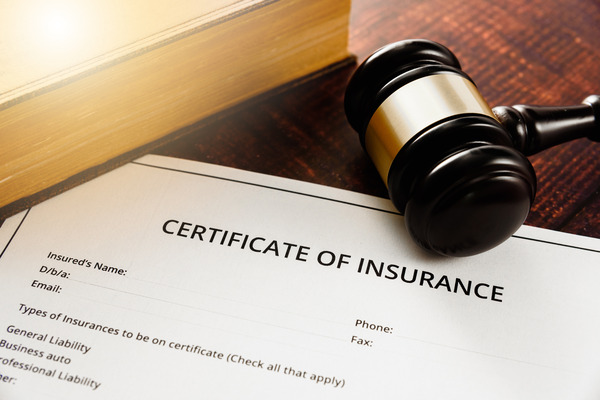When purchasing insurance for your company, you may get stuck wondering what exactly you need for coverage. After all, there are a number of different types of insurance policies, and depending on your business, they can be expensive.
While it doesn’t make sense to skip purchasing small business insurance entirely, it does make sense to only buy the insurance your business will need. While a good insurance agent will guide you towards the products that will benefit your business, it’s still a good idea to know what you’re looking at as you start.

Why Do I Need Business Insurance?
All small businesses need at least some business insurance. Companies sometimes decide not to purchase insurance because they feel the monthly cost is too high, they think they will never do anything that will cause them to get sued, or they figure they can cover any damages if it becomes necessary to do so.
Each of these reasons is unfortunately misguided. Owners should remember that a company doesn’t have to be in the wrong to get sued, and even lawsuits where the company is eventually found to be not responsible for damages must be dealt with in court. Court costs quickly add up, even if a suit never goes to trial.
If a business owner isn’t incorporated, or is not sufficiently distanced from their business, damages can potentially go beyond the business’s assets and into the owner’s personal finances.
In 2008, according to The Hartford, small businesses paid out over $105 billion for lawsuits; unfortunately, more than $35 billion was paid out of pocket.
When comparing those risks against a monthly premium, it seems obvious that getting the appropriate business insurance for any company is worth the cost. This is especially true given that the number of service businesses is on the rise. Entrepreneurs are creating more service based businesses than they have been in years past; these often focus on IT, health, and home based caregiving. These companies need different kinds of insurance than their product-providing comparison firms.
Another area of concern is businesses that focus on the Internet of Things and businesses that focus on cannabis and related products. Both of these areas are brand new as legitimate businesses, and regulations are still developing that can cover what businesses are and are not responsible for. Cryptocurrency, with the federal government still debating whether it is a currency or a commodity, can also be a volatile industry. When business types have ambiguities built into them, they are especially vulnerable to tort claims.
Let’s look at the difference between general liability insurance and professional liability insurance.
What Is General Liability Insurance?
General liability insurance covers a business against claims of bodily or personal injury or property damage. For example, if a customer came to a company’s physical location then slipped and fell on the floor, the general liability insurance could pay for legal fees and damages associated with the accident.
This insurance can also cover damages done to someone else’s property by an employee, as well as advertising mistakes.
Again, remember that even if the lawsuit is eventually shown to be spurious, the cost of defending against the suit can be incredible. As soon as someone is served with a summons, it’s important to contact a lawyer; no business owner should attempt to handle a formal lawsuit on their own.
What Is Professional Liability Insurance?
When purchasing insurance, agents may also refer to professional liability insurance as “errors and omissions insurance,” or simply E & O. This insurance covers negligence as it relates to professional services offered. This insurance is important for businesses which offer advice or services, and protects against negligence claims. Lawsuits may revolve around failure to perform the service provided or financial loss due to the negligent service.
Not every business needs professional liability insurance. Companies that only provide products, not services, will often have those liabilities covered under different policies. Some examples of businesses that may benefit from professional liability insurance include:
- Real Estate Agents: Clients might argue that an agent or brokerage has failed to do due diligence during the inspection and purchase process. For example, clients could refuse a home inspection, but then be furious when someone breaks the day they move in. Even if the brokerage has a signed waiver, the client could still sue.
- Mortgage Brokerages: Interest rates and financial markets can be more volatile than customers expect. Substantial amounts of money are involved, so customers may be concerned at seeing the lifetime cost of their mortgage change. If a brokerage was unable to produce satisfactory evidence of their due diligence, they might need to pay damages.
- Fitness Centers: In many fitness centers, staff and trainers are responsible for advising customers on how to best achieve their fitness goals. Even the most careful gym, however, can’t prevent every single injury. If a trainee injuries their knee during their recommended burpees, for example, they could choose to sue the gym to cover their medical costs. The gym would need to defend itself in court.
- Accounting Firms: Accounting firms handle much more than basic profit and loss statements. They may prepare taxes, send out W2s and 1099s, and determine what a business can deduct on their tax returns. If they make even small mistakes, the business may end up being responsible for huge penalties on their taxes. While they may be directly liable to the IRS, the company may attempt to hold the accounting firm liable. Professional insurance could help to cover the cost of the mistakes.
- Public Relations: PR companies now handle many different areas for the average business. They may manage social media feeds, place blogs and articles in different locations, and work with graphic designers to create high quality websites and logo designs. There are so many places that mistakes can be made here. Sending out the wrong tweet at the wrong time can cause a great deal of damage to a company’s reputation, for example; the company could choose to sue the PR firm for financial damages caused by their mistake.
- Writers, freelance and agencies: writers may not think about needing professional liability insurance, especially small freelancers. But writers have some of the same potential liabilities as PR companies. They also need to be cautious about plagiarism. Some content creation techniques encourage writers to pull information from other, more popular articles. If enough information isn’t updated or changed, the writer may end up being liable in two directions. From one side, the original article writer could pursue them for copyright violation. From the other, the business might sue for damages done by poor rankings and business damage due to search engine results.
The Cost Of Going Without
Let’s pretend for a moment that you, like many business owners, decided to go without liability insurance. Since you’ve never had an issue before, you’re unlikely to have one in the future. Let’s look at the example of a freelance writer.
Suddenly, you get a complaint from a customer. They state that you plagiarised work, and that they’re now losing customers due to the original author’s complaints on social media while also being ban-listed by Google for duplicating work. They’re suing you for damages and want $10000 as compensation for their lost revenue.
At the bare minimum, you need to pay:
- Legal fees. Lawyers can cost from $150 to $350 an hour, or more, depending on the complexity of your case and the industry.
- Copying and filing fees for court documents; these add up more quickly than you would think.
- In court, the company could be awarded some or all of the damages they’re claiming.
At the same time, you may find:
- Your professional reputation is damaged as word spreads about the lawsuit,
- More clients may choose to sue you, examining their own work more closely and finding problems, real or imagined,
- Potential clients may believe that your work isn’t as good as you believe. You may have to lower your rates, or you may lose clients before you even get the chance to talk to them.
In 2016, surveyed experts stated that while the number of lawsuits covered by professional liability insurance was roughly the same, the cost and damages of those lawsuits was increasing rapidly.
It’s important to remember that many of the lawsuits that seem frivolous once the media picks them up become more understandable when you are a party involved in the case. With the example of injuries that require medical care, health insurance will sometimes refuse to cover the cost of treatment until other insurance options have been exhausted. This can mean that the injured person has no choice but to sue a business to get their healthcare covered.
Having full insurance customized to your business needs is the easiest way to build long term business health.











